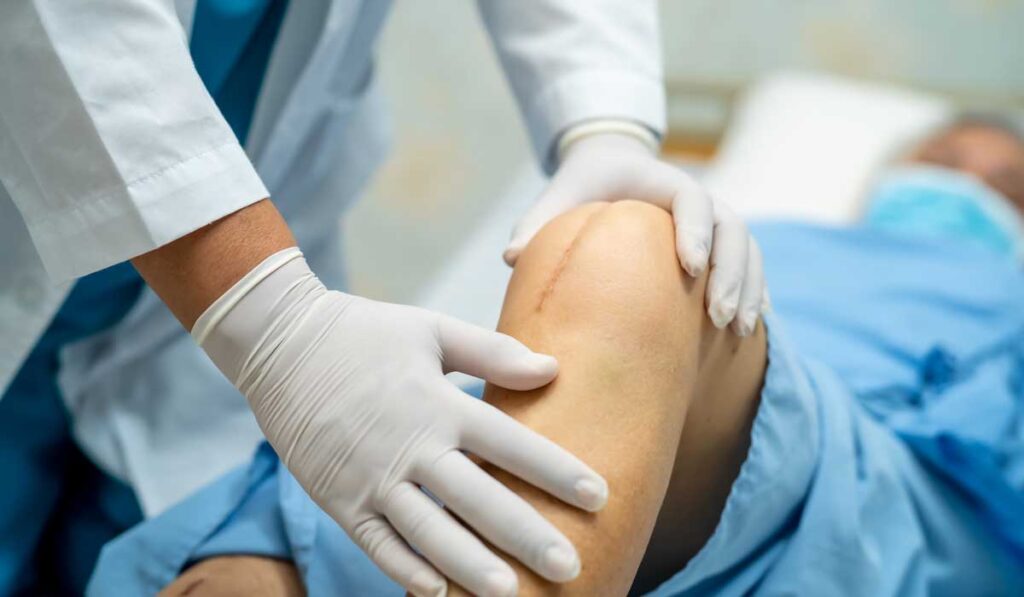Corticosteroids, most commonly dexamethasone, are routinely used to manage the hyper-inflammatory state that can follow the trauma of total knee arthroplasty (TKA). Yet, since nearly a tenth of TKA patients in the United States have diabetes, the joint infection risk from glucose spikes associated with these drugs are under scrutiny.
A research team led by Gregory Polkowski, M.D., executive medical director of the Orthopaedic Patient Care Center and chief of the Division of Adult Reconstruction at Vanderbilt University Medical Center, has probed the debate by examining the impact perioperative corticosteroid use has on postoperative glucose levels and infection risk across patients with and without diabetes.
Ryan Martin, M.D., an associate professor of orthopaedic surgery at Vanderbilt, was an author on the retrospective study as well, and Vanderbilt resident Alexander Volkmar, M.D., recently presented it to the American Academy of Orthopedic Surgeons. They recently submitted their results for publication.
“Corticosteroids are associated with higher glycemic levels, and some research indicates that even mild hyperglycemia is significantly associated with periprosthetic joint infection,” Polkowski said. “As orthopaedic surgeons, it is often a balancing act to control inflammation and yet maintain glycemic control perioperatively, so we wanted to know more about this relationship.”
What they found is that even though dexamethasone likely causes a slight increase in postoperative glucose levels, there is not a significant increase in infection rates or other negative side effects.
The Double-edged Sword
Dexamethasone has been shown to reduce the amount of pain that patients have after surgery, lowering their consumption of narcotics. It also is an antiemetic that can help minimize nausea related to general anesthesia.
“It pretty much cuts their inflammatory response in half in a lot of patients, which correlates with an easier recovery and with a lower complication profile afterwards,” Martin said.
Yet, its potential to increase infection risk could make its use in patients with diabetes a perilous gamble.
The periprosthetic infection risk is about 2.6 percent in TKA patients without diabetes and 4.3 percent in those with diabetes, with highest numbers from patients with type 2 diabetes. A patient who develops an infection often has a second surgery with components removed, followed by three to six months of antibiotics before reimplantation can take place. Some patients can even lose their leg.
“Infection is arguably the most devastating perioperative surgical complication the patient can have,” Martin said. “This is a huge risk for anyone having any surgery, but particularly onerous when it is an elective surgery.”
“Now that we are avoiding narcotics, we have to figure out the right combination to make sure we are not overdoing the dexamethasone. We’re always weighing the risks and benefits.”
Does Elevated Blood Glucose Matter?
The study team at Vanderbilt reviewed 5,353 patient records, checking postoperative day one glucose levels in patients with and without diabetes who took dexamethasone and those who did not.
Evidence suggests that periprosthetic joint infection risk may increase linearly, beginning at blood glucose levels at or above 115 milligrams per deciliter. The team aimed to learn what percentage of Vanderbilt patients had postoperative day one glucose levels above 137 milligrams per deciliter, the Rothman cut off for elevated infection risk, and whether the administration of dexamethasone further increased this elevated glucose risk.
“It helped affirm what we’ve seen anecdotally here in our institution – that judicious use of dexamethasone is generally safe.”
They found a significantly greater percentage of patients who received dexamethasone spiked a glucose level of 137 milligram per deciliter or higher (55.2 percent versus 37.7 percent) regardless of diabetes status. While there was a slight increase in infection risk across the entire population of dexamethasone users (1.7 percent versus 1.0 percent), it did not reach statistical significance.
The authors conclude that while the study shows dexamethasone to be fairly safe and that elevated glucose levels apparently fail to correlate with infection, larger studies will be necessary to make sure that infection risk doesn’t rise to significance as the sample size grows.
Optimizing Safe Pain Management
“Ours was a fairly large study, and it helped affirm what we’ve seen anecdotally here in our institution – that judicious use of dexamethasone is generally safe,” Volkmar said. “Still, because infection can be so catastrophic with our patients who have diabetes, we go to great measures to control blood glucose levels before, during and after surgery, and avoid corticosteroids.”
Volkmar says over half of the knee replacements performed at Vanderbilt are now being done on an outpatient basis, where the patient generally goes home on the same day.
“As orthopaedic surgeons, it is often a balancing act to control inflammation and yet maintain glycemic control perioperatively, so we wanted to know more about this relationship.”
“The only way that’s possible is by us incorporating a multimodal pain management pathway after surgery to help block pain and inflammation receptors,” he said.
“The use of steroids like dexamethasone is part of the plan, so it’s something that most patients get. Now that we are avoiding narcotics, we have to figure out the right combination to make sure we are not overdoing the dexamethasone,” Martin said. “We’re always weighing the risks and benefits.”







